May 22, 2025 | 13:35 GMT +7
May 22, 2025 | 13:35 GMT +7
Hotline: 0913.378.918
May 22, 2025 | 13:35 GMT +7
Hotline: 0913.378.918
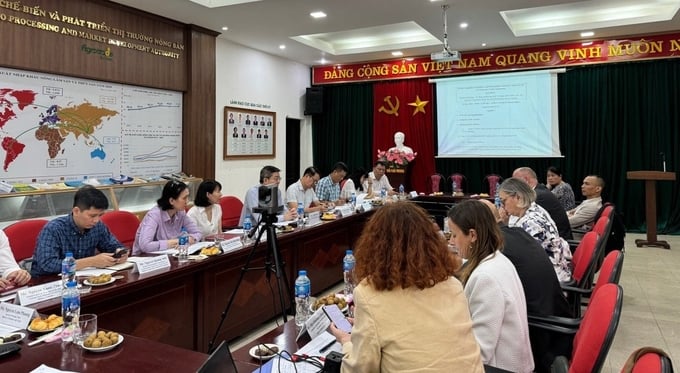
The working session between DG SANTE and Vietnamese management agencies, with the focal point being the Vietnam SPS. Photo: Bao Thang.
Vietnamese beef noodle soup ("pho") is a traditional Vietnamese dish loved by many international friends. For many years, dried packaged pho has been exported to the EU. However, packaged pho does not bring freshness, deliciousness, and true flavor compared to enjoying it directly.
Particularly interested in pho, Mr. Renzo Moro, a sanitary epidemiologist and plant quarantine expert at the Italian Embassy, asked when his European friends could enjoy a bowl. Pho has a Vietnamese flavor, full of beef and spices. From December 15, 2022, Regulation (EC) 2022/2292 takes effect, including many new regulations on composite products (ComP), of which pho is one subject to control.
"Before Regulation (EC) 2022/2292, products like pho were divided according to the ratio of processed products of animal origin (PPOAO). However, this regulation has changed," Mr. Moro stated the problem.
Regulations related to hygiene and food safety in the EU are directly advised and issued by the Directorate-General for Health and Food Safety, European Commission (DG SANTE). This agency also makes assessments and implements monitoring measures to ensure food in Europe is sustainable and safe.
Mrs. Sylvie Coulon, senior expert of DG SANTE, informed that in the new regulation (EC) 2022/2292 on ComP, any food source that only needs to contain ingredients of animal origin is subject to this regulation due to the increased risk of disease outbreaks from processed products of animal origin.
The EU distinguishes between composite products (ComP) and processed products of animal origin (PPOAO) as follows: ComP is a food containing both products of plant origin and processed products of animal origin.
In particular, products not of plant origin, have but do not change the characteristics of processed products of animal origin, or processed products of animal origin that have not been processed are not considered ComP.
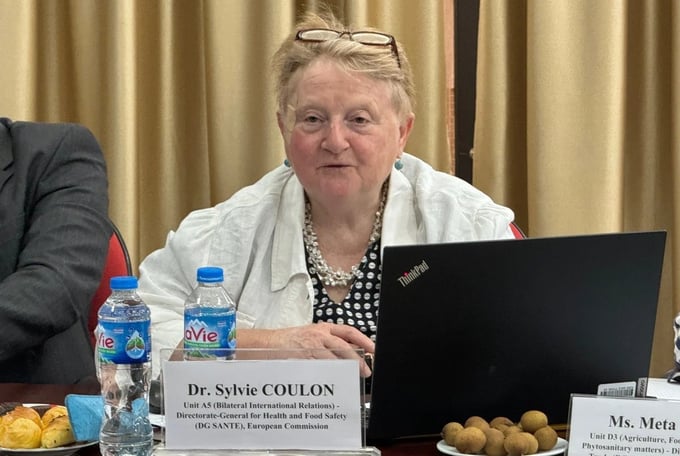
Mrs. Sylvie Coulon, Senior expert of DG SANTE. Photo: Bao Thang.
In addition to pho, Mrs. Coulon gives examples of fresh salmon tartare, fresh chicken skewers with pepper, and sushi. All are not considered ComP.
"To know whether a product is classified as a ComP or not, we need to answer 4 questions: Processed products of animal origin? Have the ingredients of animal origin been processed? Is the product 'Does ingredients of plant origin change the properties of ingredients of animal origin?" she shared.
Regulation (EC) 2022/2292 is divided into 3 levels for ComP. In order of risk level from low to high: Non shelf-stable - The product only contains processed meat and has a long shelf life; Shelf-stable - Product contains colostrum-based products or processed meat; Shelf-stable - Products containing colostrum-based products, milk, processed seafood, meat, or derived from eggs.
Returning to the story of pho, Vietnam currently meets the standards according to Regulation (EC) 853/2004, which limits ingredients to only processed meat and does not include processed meat. Therefore, under current conditions, Vietnam cannot export pho to Europe.
"How can you export pho?", Mrs. Coulon continued to ask. According to the representative of DG SANTE, thanks to the promulgation and planning and good monitoring process of seafood and honey products, Vietnam is classified by the EU in Regulation (EU) 2021/404, which means the export of ComP is allowed to export to the EU.
However, what products to export, where the raw materials come from and what standards the establishments producing needs to meet are currently issues.
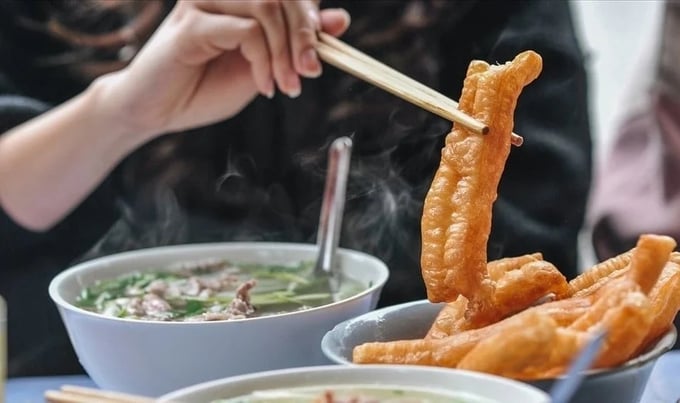
Pho is a traditional Vietnamese dish, loved by many international friends. Photo: Bao Thang.
Regulation (EC) 2022/2292 outlines the various rules with which food imported into the EU must comply. Specifically, all ingredients of animal origin in ComP must be processed in establishments producing approved by the EU and in countries permitted to export ComP into the EU.
Regarding the establishments producing, if the EU has approved it under the previous regulations on the PPOAO, such as Regulation (EC) 853/2004, and without further processing or with additional processing of the PPOAO, independently from the processing of the final ComP (cooking biscuits using an egg product), register on the system.
.Suppose further processing of the PPOAO, independently from the processing of the final ComP, such as processing a dairy product into milk powder to make ice cream or from unprocessed products of animal origin that will be processed in the establishment manufacturing of the ComP. In that case, the establishments must submit documents and wait for EU appraisal and approval.
On the national level, the EU divides countries into annexes stipulating which countries can export which products to the EU. For example, Vietnam is in Regulation (EU) 2021/405 and is allowed to export seafood and processed meat to the EU but not to export products made from milk, or eggs.
On the contrary, Thailand is on Regulation (EU) 2021/405 and Regulation (EU) 2021/404, so it can export products like Vietnam's and ComP with ingredients made from eggs.
"To export ComP to the EU, businesses must meet all three elements: a qualified raw material source, an EU-certified establishment, and a country allowed to export that product. Only one element is required; for example, if an enterprise is not on the list of countries allowed to export, even if it imports qualified raw materials, it will not be allowed to bring goods into the EU," Mrs. Coulon emphasized.
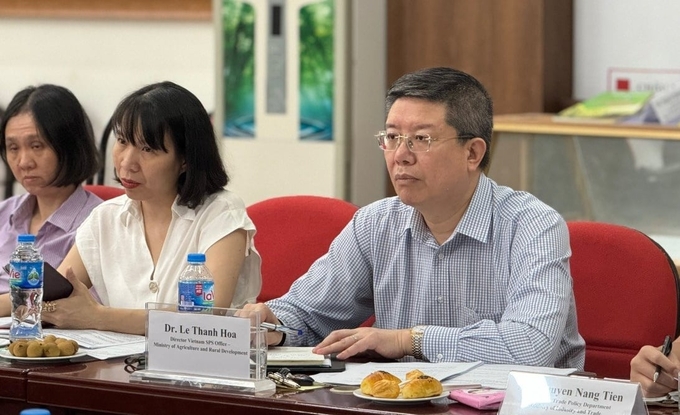
Dr. Le Thanh Hoa, Director of Vietnam SPS, the agency co-chairing the conference with DG SANTE. Photo: Bao Thang.
Through the Conference "Disseminate regulations on the import conditions of plant and animal derived agricultural products and foods into the EU" that DG SANTE co-organized with the Vietnam Sanitary and Phytosanitary Notification Authority and Enquiry Point (Vietnam SPS), the EU delegation recommended businesses before planning to produce synthetic products for export to the EU, it is necessary to check and make sure all regulations and conditions are complied with or not.
"You should not speculate but need to consult with management agencies and professional agencies to grasp the regulations firmly. If necessary, you can contact DG SANTE to avoid the situation of goods being returned or destroyed at the border gate," DG SANTE representative advised on more than 300 online connection points, which are Departments of Agriculture and Rural Development, Department of Industry and Trade, associations and businesses in related industries.
Also, according to Mrs. Coulon, the new regulations on ComP products are of interest to many countries because they are precious goods that can promote the brand and image of a country. However, due to the complexity of Regulation (EC) 2022/2292, the EU is committed to supporting every WTO member state in its implementation.
For "powerhouses" that export agricultural and food products like Vietnam, expert Sylvie Coulon believes there needs to be more transparency in information related to assessment and handling measures, minimizing the risks of originating products from animals.
Three groups of ComP, divided by the EU according to risk level, are detailed by the bloc in Annex III and V of Regulation (EU) 2020/2235.
ComP are generally strictly controlled according to regulations at the border gate to limit epidemics. The EU will require accompanying procedures, such as a food safety certificate, depending on the product and exporting country.
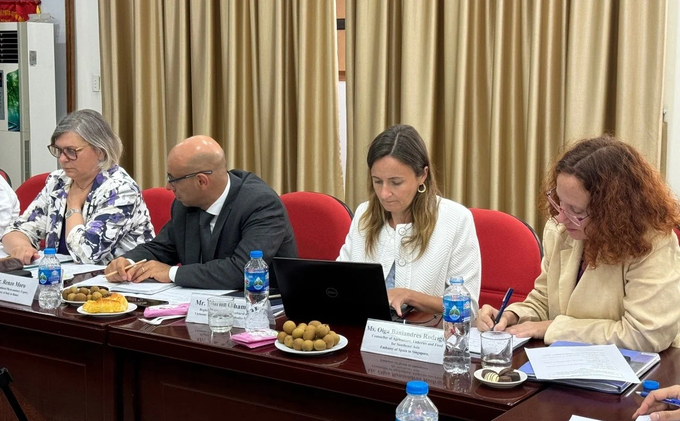
EU delegation during the regulations dissemination session in Hanoi. Photo: Bao Thang.
At the meeting, Mrs. Coulon appreciated Vietnam's efforts in controlling and ensuring food hygiene and safety exported to the EU, especially instant noodle products, which is the basis for the EU to consider, vote, and decide whether to increase or decrease the frequency or remove it from the controls and emergency measures on certain imported goods.
Based on good compliance with EU regulations for instant noodles, the EU plans to remove this product from the list in Appendix I, which will be updated in July 2024. If nothing changes, DG SANTE will propose that Vietnamese instant noodles will no longer be subject to the 20% border inspection frequency when imported into the EU.
The representative of DG SANTE also said that the optimistic signals from instant noodles, in particular, fiber products made from rice, in general, are the premise for one day shortly, European people will soon be able to enjoy Vietnamese pho.
Dr. Le Thanh Hoa, Director of the Vietnam SPS, said that compliance with food safety regulations of the importing country is a mandatory condition for Vietnamese agricultural and food products to go further on the international stage.
"DG SANTE's recommendations and assessments are significant. Hopefully, with close coordination from you, Vietnamese agricultural and food products will become increasingly quality and information transparent, contributing to making Vietnam the world's kitchen," Mr. Hoa shared.
Translated by Huong Giang

(VAN) The draft amendment to the Circular on rice export trading stipulates a periodic reporting regime for rice exporting enterprises.

(VAN) Dong Thap farmers attained an average profit margin of 64% during the summer-autumn 2024 crop (first season), while An Giang and Kien Giang farmers followed with 56% and 54%, respectively.

(VAN) As a doctoral student doing research on renewable energy and electrification at Harvard University, the author shares his musings on electricity, nature, and countryside memories.

(VAN) The decree on Extended Producer Responsibility (EPR) ensures transparent management and disbursement of support funds, avoiding the creation of a “give-and-take” mechanism.

(VAN) Hue City rigorously enforces regulations regarding marine fishing and resource exploitation, with a particular emphasis on the monitoring of fishing vessels to prevent illegal, unreported, and unregulated (IUU) fishing.

(VAN) Hanoi People's Committee has issued a plan on reducing greenhouse gas emissions in the waste management sector with 2030 vision.

(VAN) Vietnam's draft amendment to Decree No. 156 proposes a mechanism for medicinal herb farming under forest canopies, linking economic development to population retention and the sustainable protection and development of forests.